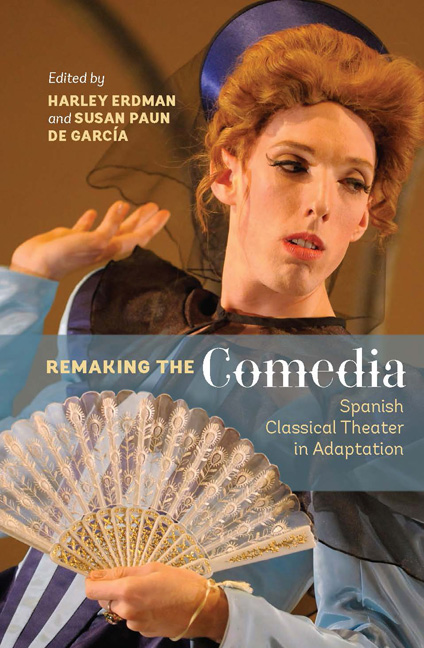Book contents
- Frontmatter
- Contents
- Illustrations
- Contributors
- Preface
- Note to the Reader
- Acknowledgements
- PART I THEORIZING
- PART II SURVEYING
- 5 Refundición Redux: Revisiting the Rewritten Comedia
- 6 Pepe Estruch and the Performance of Golden Age Drama: International Relationships under Franco and Democratic Theatrical Cultures
- 7 Thinking Globally, Acting Locally, and Performing Nationalism: Local, National, and Global Remakes of the Comedia
- 8 Four Decades of the Chamizal Siglo de Oro Drama Festival and the Evolution of Comedia Performance
- 9 Early Modern Dramaturgas: A Contemporary Performance History
- 10 Adapting Lope de Vega for the English-Speaking Stage
- PART III SPOTLIGHTING
- PART IV SHIFTING
- Play Titles Cited
- Works Cited
- Index
7 - Thinking Globally, Acting Locally, and Performing Nationalism: Local, National, and Global Remakes of the Comedia
from PART II - SURVEYING
Published online by Cambridge University Press: 05 December 2015
- Frontmatter
- Contents
- Illustrations
- Contributors
- Preface
- Note to the Reader
- Acknowledgements
- PART I THEORIZING
- PART II SURVEYING
- 5 Refundición Redux: Revisiting the Rewritten Comedia
- 6 Pepe Estruch and the Performance of Golden Age Drama: International Relationships under Franco and Democratic Theatrical Cultures
- 7 Thinking Globally, Acting Locally, and Performing Nationalism: Local, National, and Global Remakes of the Comedia
- 8 Four Decades of the Chamizal Siglo de Oro Drama Festival and the Evolution of Comedia Performance
- 9 Early Modern Dramaturgas: A Contemporary Performance History
- 10 Adapting Lope de Vega for the English-Speaking Stage
- PART III SPOTLIGHTING
- PART IV SHIFTING
- Play Titles Cited
- Works Cited
- Index
Summary
In an article titled “Can Cultural Studies Speak Spanish?” J. Mariscal laments how cultural studies limits its inquiry to the cultural production of the present and recent past only. Such “presentism” ignores the considerable activity surrounding the revival of “classical” cultural artefacts. Early modern comedias play a different role in contemporary cultures than does the original work of living playwrights, and in many ways a more complicated one. This essay will confront the inherent complexity of studying contemporary performances of early modern comedias by addressing how they constitute a nexus of cultural, economic, and political concerns that operate simultaneously at local, national, and global levels. Only by examining this complexity and by understanding the interplay of these local, national, and global concerns can we fully assess the vitality of Spanish Golden Age theater today.
Unlike the study of contemporary theatrical production and consumption, studies of Comedia performance must take into account questions of diachronic cultural valuation and association. While they must look forward to the implications of what current theatrical activity says about the value of the Comedia to the communities by and for whom it is performed, they must also look to the past in order to understand the cultural baggage associated with the tradition since the Golden Age. Just as with the study of contemporary performances of Shakespeare in the English-speaking world, early modern Spanish theater has a long history of cultural, economic, and political invocation, appropriation, and co-optation throughout the Spanish-speaking world—a history of which each contemporary production and audience is potentially aware (albeit to varying degrees) and against which any particular re-casting is staged. There is, in other words, an ongoing and cumulative history of Comedia performance whose narrative is inseparable from any particular performance itself.
Such a history is treated from a variety of productive angles in this volume and in a number of recent publications, but what remains elusive is a comprehensive overview of how local, national, and global productions of early modern Spanish theater constitute different threads interwoven into a complex intercultural fabric.
- Type
- Chapter
- Information
- Remaking the ComediaSpanish Classical Theater in Adaptation, pp. 65 - 74Publisher: Boydell & BrewerPrint publication year: 2015



